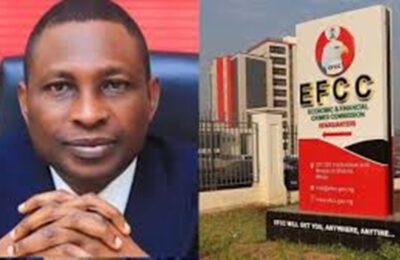By Ralph Omololu Agbana.
- As Kogi West Insists On Power Rotation
The 2019 governorship election has come and gone, leaving the outcome under contention. The final outcome, following in the trend of contemporary electoral system, will be determined by the election tribunals. Yet, irrespective of the decision of the courts, what is in focus is the emerging voting pattern in the state. The losers are the majority tribe, the Igala who had ruled the state from inception in 1991, until the 2015 election. Unless otherwise decided by the jurists, the 2019 polls has occasioned the birth of additional four years for Governor Yahaya Bello and the minorities in the state.
In real contest, it was thought to be unrealistic for the minorities to win the governorship election in a state dominated by the Igala in Kogi East. The East zone alone with nine out of 21 local councils is put at 55 percent of the state’s population. The breakdown of voter distribution also showed that Kogi East Senatorial district has the highest number of voters with 804, 715. Kogi West is second with 432, 515 voters, while Kogi Central is third with 409,120 voters
When, in 2016, the incumbent Governor Yahaya Bello became the first non-Igala to be sworn-in as governor, it was taken for granted that that only happened as a result of the death of the APC governorship candidate for the 2015 election, Prince Abubakar Audu.
It was thought to be impossible in a real contest between a candidate of Igala extraction and a candidate from either Kogi Central or West. Pundits were proved wrong as Bello, an Ebira did not only win the 2019 election he won by a landslide, from the result announced by the Independent National Electoral Commission (INEC).
If it stands, the reality will be that the Igala would be out of power for eight years.In last year’s election, the factor of ethnicity, use of state power and money all played a big role, with the Igala at the receiving end. It was observed by election monitors that all parties were guilty of vote buying and exploitation of the ethnic card but it was the Igala who were outsmarted this time. The umbrella Igala socio-cultural organisation Igala Cultural and Development Association (ICDA), national and Diaspora, mobilised Igala sons and daughters to vote massively for Musa Wada of the PDP so as not to give room for the “disgrace of the kingdom”.
Likewise, Bello’s supporters in Kogi Central were vociferous in issuing threats to Ebira who dared to vote for Igala candidate. The votes garnered by the APC in Kogi Central showed that half of the total winning votes for Bello came from the central alone. The Igala whose candidates won past elections in the state with landslides were left stunned as the votes recorded in the entire East zone with nine councils were less than the votes cast in the five local councils in the Central.
Although the conduct of the election has come under serious condemnation by observers and members of the opposition parties, a section of the Kogi public, especially from West and Central Senatorial districts blamed the political elders in Kogi East for the trend of the 2019 election. They noted that the reluctance by the majority ethnic group to hearken to clarion call for rotation of power between the majority and minorities was what gave rise to fear of domination and mutual suspicion, hence the determination by the minorities to stop the return of power to the East, “by any means necessary”.
It will be recalled that former deputy chief of staff in the presidency, Prince Olusola Akanmode, a Yoruba from Kogi West who was a governorship aspirant in 2011 had appealed to Igala political leaders to ensure the initiation of the process that would lead to equitable sharing of power amongst the three senatorial districts. He had warned that the continued domination of government by the majority Igala would not augur well for the unity and cohesion of the state. Akanmode is famous for his popular admonition to the majority group to consider conceding power to either Okun or Ebira “when you have the choice and not wait until you no longer have the choice”.
Akanmode’s prediction indeed came to pass after the tragic death of Abubakar Audu. Yahaya Bello, an Ebira ascended the seat of power, and four years after, he was re-elected. If Yahaya Bello’s election stands, going forward, the 2023 election will provide another opportunity for the Igala to re-strategise, if they must regain power. This is against the feeling in Kogi West; that the majority Yoruba zone deserves to pick the baton of the governor of the state after the Ebira.
Prior to 2015, the Ebira and Okun were at the forefront of the agitation for power shift, ethnic consideration being the hallmark of the determination of votes in that state.
Those in favour of the West to produce the next governor feel that the performance of the APC in Kogi West in the 2019 governorship put the zone in good stead to demand for the party’s governorship ticket come 2023. From a total registered voters in the East zone, put at 804, 715, the total votes cast for Yahaya Bello/APC stood at 90, 317, representing 11.22 percent. In Kogi West, from a possible 432,515 total of registered voters, the zone returned 79, 899 votes for the APC governorship candidate, representing 18.47 percent of the total registered voters in the zone.
Beyond the gauge of performance in terms of numbers, there has emerged a movement for rotation of power to the West based on the argument that the East has had a fair share. They argued that Prince Audu, the first democratically elected governor, ruled the state from 1991 to 1993 when the Third Republic was abruptly truncated. Audu was re-elected in 1999 and he ruled until 2003 when Alhaji Ibrahim Idris succeeded him. Idris ruled the state for two terms, 2003 to 2012. Idris Wada, who did one term, 2012 to 2016, succeeded his kinsman, while Yahaya Bello, the incumbent is from Central Senatorial District.
A source in the APC top echelon from Kogi West zone, noted: “Only the West is yet to produce an elected governor. The feeling is that power rotation to the West can only happen now that a fellow minority is at the helms. The opportunity may not come soon should Governor Bello decide to hand the reign of power back to the East in January 2024. The West and Central are realising that for power to go back to the East, it will take all the nine local governments in the East to produce a governor each before the minorities ever taste power again. The result of the 2019 governorship election is a eye opener. It shows that the two senatorial districts (West and Central) can come together to win the governorship. I blame our brothers from Igala. They held on to power for too long, making the other senatorial districts to look inferior.”
A prominent Igala political leader, Dr. Idris Omede, former national president, Nigerian Medical Association (NMA), the 2019 governorship election results did not reflect the wishes of the electorate. Omede said there should be no asking the question about the feelings in Kogi East in the aftermath of the November 2019 governorship election but the feelings in the state as a whole.
“I see or perceive it more to be the feelings in the state. Nonetheless, for Kogi East, the feelings are that of dissatisfaction, disenchantment, anguish and pains arising from electoral agony, tragedy, violence, destruction, irregularities, harassment and intimidation. These were what characterized the November 16 2019 election in favour of the incumbent governor and the ruling party in Kogi state.
“Most of us believe that our creator, Allah, the All knowing, All seeing and All hearing amongst His many attributes, use human being as tool to give power, influence, and knowledge to whom He wishes. As responsible and law abiding people, we still have faith, confidence and believe that if it is the will of Allah, He will right the wrongs through the judiciary.
“My take is that the declared winning votes did not reflect the wishes of the people from the various polling units and the ward and Local government collation centres, through bottlenecks created by some INEC ward collation agents, aided by the security and ruling party supporters against all other parties’ candidates.
“It is my expectation and the expectation of many that the Kogi State governorship electoral fraud will not stand through the legal redress processes instituted by PDP and other aggrieved and disenfranchised political parties’ candidates against the incumbent governor and APC in the state election tribunal. It is our hope that the judiciary will right the wrong. However, in the event that the current position is upheld, we believe that the tenured post, which is not forever, will come to an end some day.
If election and democracy is about wishes and interests of people, then the factors that work for electoral victory and free, fair and just elections, ranging from population size, voting population and strength, delivery of dividend of democracy, an improved electoral act and host of other considerations, will work in favour of Kogi East. It is only in Kogi State that the government of the day would not allow opposition to campaign in the senatorial district of the Chief Security Officer of the state or the governor. The implications of this in terms of vote cast is not difficult to imagine.”
Meanwhile, despite its defeat, the Peoples Democratic Party (PDP) is hopeful that the elections would be overturned. If that happens, then the struggle for power rotation is going to assume another dimension.
First published in Guardian




